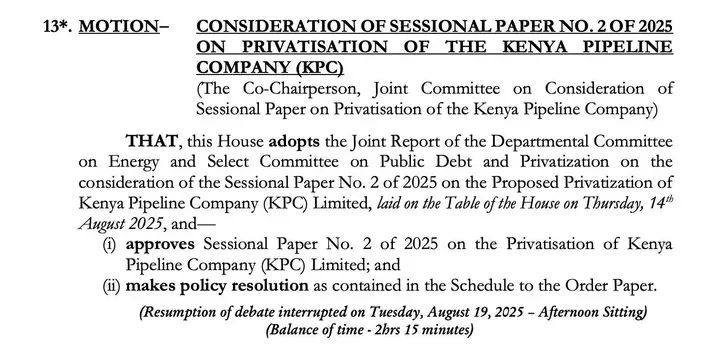MPs Approve Privatization of Kenya Pipeline Company
Share
The National Assembly has approved Sessional Paper No. 2 of 2025 regarding the privatization of the Kenya Pipeline Company (KPLC) Limited, thereby granting approval for the policy framework governing the privatization of the state corporation.
This follows the consideration and adoption of the Joint Report of the Departmental Committee on Energy and Select Committee on Public Debt and Privatization on the consideration of the Sessional Paper No. 2 of 2025 on the Proposed Privatization of Kenya Pipeline Company (KPC) Limited.
Members of the National Assembly further adopted the following policy resolution relating to privatization of the Kenya Pipeline Company.
Suitability for privatization of Kenya Pipeline Company Limited
Kenya Pipeline Company Limited is a strategic state corporation of critical national and regional significance, serving as the backbone for petroleum transportation and storage in Kenya and neighbouring countries; and is suitable for privatization.
Government shareholding pre and post IPO
The government retains not less than thirty-five percent of shares of Kenya Pipeline Company Limited and may privatize not more than 65 percent of government ownership in the company.
Availability of valuation and transparency
On valuation, the Privatization Commission: Ensures that the valuation of the company is contained in the prospectus;
Publishes a separate citizen-friendly IPO valuation report that should be produced and publicized for the general public; and,
Undertakes a valuation of the actual financial and asset position of the KPC and submit a report to the National Assembly. This should also take into account the future potential of the business in compliance with section 31 of the Privatization Act, 2005.
Post Audit Process
The Office of the Auditor General audits the processes relating to privatization of Kenya Pipeline Company Limited to ensure value for money and submit a report to the National Assembly within six months of completing the processes.
Safeguarding affected parties and key stakeholders
In respect of the employees of Kenya Pipeline Company Limited, the Privatization Commission ensures that the employees of Kenya Pipeline are included in an Employee Share Ownership Plan.
Ownership limits for stakeholders
The Privatization Commission takes steps to safeguard against excessive concentration of shares in a single entity or related parties, and shall set a maximum ownership limit for any one shareholder to help preserve broad-based ownership, promote market competitiveness, and protect national and energy security interests.
Valuation costs and risks
The Privatization Commission ensures that all liabilities (debt and credit) and risks affecting the valuation of KPC are comprehensively assessed, transparently disclosed, and factored into the transaction valuation before proceeding with the IPO.
Pending lawsuits amounting to Kshs. 5.75 billion;
Unresolved compensation claims worth Kshs. 3.8 billion by residents of Makueni County due to historical grievances linked to pipeline operations.
Loss of approximately Kshs. 400 million in the Mzima pipeline project due to stalled execution and procurement lapses, a garnishee order of Kshs. 485 million in favour of M/s. Zakhem International following contractual disputes over the Line V project.
The potential loss of public funds amounting to Kshs. 192.6 million after Asharami Synergy took over the LPG facility despite prior investment by KPC.
Treatment of subsidiaries
A clear statement be included in the prospectus on how Kenya Petroleum Refineries Limited, a subsidiary of Kenya Pipeline Company Limited, has been financially evaluated and factored in the valuation of Kenya Pipeline Company Limited.
Procurement of transaction advisors
The procuring and engaging of transaction advisers should be done transparently and competitively, and the cost of the transaction (currently set at Kshs. 100 million) should not deviate from reasonable market rates, and approval from the National Treasury should be sought before any increase.
Use of proceeds
The proceeds projected to be Kshs. 100 billion be utilized in either development expenditure, pending bills, or liability management.
Periodic reporting on privatization transactions
The Privatization Commission reports to the National Assembly each stage of the implementation of the process of privatizing Kenya Pipeline Company Limited for continuous oversight and accountability.
Eligibility of Investors
The Privatization Commission implements a minimum level for participation by Kenyan citizens, ensuring broad local ownership from all walks of life including, and in as far as possible, the youth, women, persons with disabilities and that the process is aligned with national economic empowerment objectives in accordance with section 29 of the Privatization Act, 2005.
Safeguarding competition in the Petroleum sector
To prevent the emergence of monopoly and safeguard competition, the privatization of Kenya Pipeline Company Limited be structured to limit the mandate of the Company to transporting and storing petroleum products and guarantee that Kenya Pipeline Company Limited shall not venture into importation or sale of petroleum products without prior approval from the Competition Authority of Kenya, Energy and Petroleum Regulatory Authority and the National Assembly.
The House is expected to continue debate on the Privatisation Bill 2025 which provides the legal framework for Privatisation

The National Assembly adopts a Sessional Paper on privatization of Kenya Pipeline Company Limited on October 1, 2025. PHOTO/ Parliament of Kenya FB


